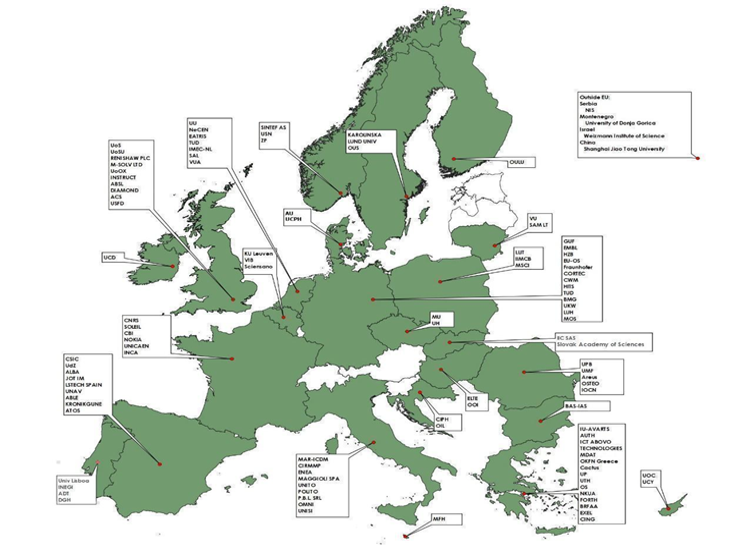Search
CLOSEInternational presence
The NHRF has a significant international presence, which is linked, on the one hand, to specific research and educational activities, initiatives, and networks and, on the other hand, to broader collaborations with important international organizations and a large number of corresponding research bodies abroad. The active participation of the Foundation’s researchers in international academic events and their collaborations with institutions abroad strengthen the extroversion of Greek research and the country’s position in the international scientific and technological arena.
In the context of joint research and educational activities, the Institutes of the NHRF collaborate with renowned academic institutions and research bodies abroad on a regular basis.
Among the institutions with which researchers at the NHRF’s Institute of Chemical Biology have collaborated from time to time are the University of Vienna (Austria), Universiteit Leuven and University of Namur (Belgium), University of Rio and University of Maringa (Brazil), Université de Montréal (Canada), École Nationale Supérieure de Chimie, de Biologie et de Physique-ENSCBP, Institut National Polytechnique de Bordeaux (France), Leibniz-Institut für Katalyse in Rostock, University of Leipzig, University of Tuebingen, Martin-Luther-Universitaet, Halle (Germany), National Institute of Environmental Health in Budapest and University of Szeged (Hungary), University of Negev, Beer-Sheva (Israel), University of Padova, University of Torino, University of Milano (Italy), University of Cyprus (Cyprus), University of Leiden, University of Maastricht (Netherlands), Örebro University (Sweden), University of Geneva, University of Basel, University of Zurich (Switzerland), École Supérieure des Industries Alimentaires de Tunis, Centre de Biotechnologie de Sfax (Tunisia), Favorsky Institute of Chemistry, Irkutsk and University of Aege (Turkey), University of Aberdeen, University of Bradford, University of Dundee, University of London, University of Oxford, University of Surrey (Great Britain) .
Researchers at the Institute of Historical Research of the National Hellenic Research Foundation have developed collaborations with numerous universities and research and academic institutions abroad that study Greek and Mediterranean history from antiquity to the modern era, as evidenced by the approximately 100 memoranda of cooperation that have been signed. The aim is to jointly submit and carry out research programs and networks, co-organize scientific events, exchange and host scientists, produce publications (Open University of Cyprus), supervision of doctoral theses (Université de Paris I Panthéon, Sorbonne and Universidad de Valladolid, Örebro University, Sweden, Harvard University, North Eastern University, etc.), internships for postgraduate students (University of Münster), etc. Indicatively, with regard to France alone, collaborations are carried out with a number of universities and the following institutions: CNRS, Maison Méditerranéenne des Sciences de l’Homme, IMéRA, École Normale Supérieure, École des Hautes Études en Sciences Sociales, Conservatoire national des arts et métiers, Observatoire de Paris, École française d’Athènes, etc. Similarly, IIE researchers collaborate with teams and participate in international committees at academic institutions in Germany, Italy, Great Britain, Spain, Albania, Belgium, Serbia, the Czech Republic, the USA, Russia, China, etc.
Research at the Theoretical and Physical Chemistry Institute has a strong international dimension, as evidenced by active collaborations with more than 70 academic and research institutions abroad, with a large number of joint publications as a direct result of these collaborations. Representative collaborations of TPCI researchers involve the following institutions abroad: University of North Texas and Northwestern University (USA), Osaka University and Nagoya University (Japan), Harbin University of Science and Technology, South China University of Technology, and Southwest Jiaotong University (China), Justus-Liebig Universitat, Friedrich-Alexander Universitat Erlangen-Nurnberg, Technical University of Munich, and Max Planck Institute for the Structure and Dynamics of Matter (Germany), University of Sussex, Durham University, and University of Southampton (Great Britain), CSIC Zaragoza, and Universidad Miguel Hernandez, Elche (Spain), CNRS Nantes, (France), Utrecht University (Netherlands), University of Cyprus, and Cyprus University of Technology (Cyprus), Jozef-Stefan Institute (Slovenia), Charles University in Prague (Czech Republic), Bulgarian Academy of Sciences (Bulgaria), Polish Academy of Sciences (Poland), “Petru Poni” Institute of Macromolecular Chemistry (Romania).
At the same time, Memoranda of Cooperation have been signed with the following foreign universities:
- German Cancer Research Center (DKFZ), Germany (2018- )
- Örebro University, Sweden (2018- )
- Northeastern University, Boston, USA (2015 – )
- The University of Science and Technology of China, USTC China (2022 -)
- University of Zagreb, Faculty of Humanities and Social Sciences, Croatia (2023- )
- The Institute for Byzantine Studies of the Serbian Academy of Sciences and Arts, Serbia (2022-)
- University of Nicosia, Cyprus (2019 -)
- University of Frederick (2025 -)
- Tel Aviv University, Israel (2021-)
- Ecole Des Hautes Etudes En Sciences Sociales (2023-)
- University of Rome TOR Vergata with IIE (2022-)
- Centrum Modernes Griechenland (CeMoG) of Freie Universitat, Berlin (2021-)
- Römisch-Germanisches Zentralmuseum – Forschungsinstitut für Archäologie, Mainz, Germany (2014 -)
Researchers at the Institute of Chemical Biology frequently participate in the preparation and supervision of doctoral dissertations, in the education of undergraduate students and postdoctoral researchers, and as guest speakers in postgraduate courses (Master’s Degree). For example, within the framework of the collaboration between the Institute of Chemical Biology and the School of Health and Medical Sciences and the School of Science and Technology, The Life Science Centre, Örebro University, Sweden, joint research activities are carried out, as well as training and mobility activities for postgraduate students, postdoctoral associates, and regular members of both sides. In this context, a Greek-Swedish Conference is organized annually (in October) in Athens at the NHRF premises. To date, 10 conferences have been successfully organized, strengthening the collaboration between the two centers.

